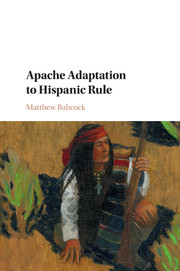Epilogue
Published online by Cambridge University Press: 05 September 2016
Summary
The U.S.–Mexican War presented Apaches with new opportunities. Taking advantage of the Mexican military's preoccupation with the U.S. invasion of Chihuahua in February 1847 and blockade of the Sonoran port of Guaymas the following fall, militant and moderate Ndé groups united and, together with Navajos and Comanches, pummeled northern Mexico with renewed vigor. Although fewer Mexican officers meant fewer chances for Ndé leaders to negotiate peace and trade agreements, their absence also meant fewer Mexican military offensives to contend with. If the U.S. military's entry in the Southwest posed a potential obstacle for the Apaches, Ndé leaders appreciated that these soldiers were also fighting Mexicans and could help them police the most unruly traders, miners, and settlers. Offering higher quality goods, including firearms and ammunition, the increasing number of American traders west of the Rio Grande after 1846 offset the immediate need for many Ndé groups to renegotiate peace in northern Mexico in the first place.
Although scholars routinely claim that the United States acquired nearly half of Mexico's national territory in the Treaty of Guadalupe Hidalgo in 1848, that perspective ignores the fact that American Indians, including Apaches, who were not consulted in the treaty controlled the majority of that land. The influential Chihene Mogollon Nantan Mangas Coloradas demonstrates this well. By following a combined strategy of peace, neutrality, and war, his Chihenes retained control of virtually all of Chi'laa, and, together with allied Chokonens and Nednhis, helped former Apaches de paz extract revenge on Chihuahua and Sonora by punishing the communities that had wronged them.
After three years of intensified warfare with Mexico, a minority of Southern Apache political leaders continued to negotiate treaties with Mexican officers at the presidios where they formally settled at peace. War-weary headmen such as Vívora, Francisquillo, and Coleto Amarillo, whose people had formerly settled near Mexican presidios and served as auxiliaries, tried to reestablish the old pattern at Galeana and Janos in February and March 1849. They failed to settle permanently, however, most likely because they were afraid of being held as prisoners by Mexican officers or killed by Mexican and American Apacheros (Apache scalp hunters). One exception was the Chihene El Negrito de Carretas (brother of Ronquillo), who resided at Janos presidio and advised the post commander on Apache affairs.
- Type
- Chapter
- Information
- Apache Adaptation to Hispanic Rule , pp. 250 - 260Publisher: Cambridge University PressPrint publication year: 2016



